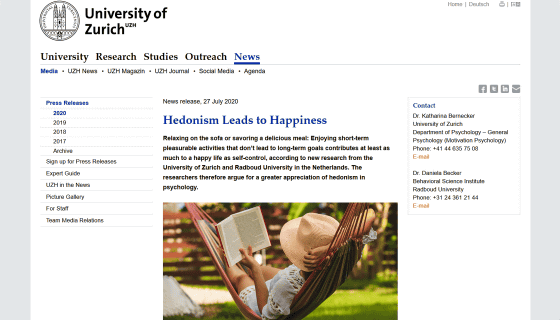Pointed out that it is important for happiness not only to make efforts to stoic but to leave yourself in temporary pleasure

It is generally believed that maintaining self-control to reach long-term goals in life, refraining from overeating and eating, and learning to lead to work increases the well-being of life. However, researchers
Beyond Self-Control: Mechanisms of Hedonic Goal Pursuit and Its Relevance for Well-Being-Katharina Bernecker, Daniela Becker, 2020
https://journals.sagepub.com/doi/10.1177/0146167220941998
UZH-Hedonism Leads to Happiness
https://www.media.uzh.ch/en/Press-Releases/2020/Hedonism.html

Since many people think of setting long-term goals and striving to achieve them in the context of life well-being, there has been a great deal of research into how to achieve those goals efficiently. It was. However, on the other hand, the assumption that “prioritizing long-term goals rather than temporary pleasures, and controlling themselves well and controlling themselves leads to a happy life” has been neglected much. It was not there.
The two created a questionnaire that measures their 'ability to enjoy temporary pleasures and joys.' Respondents' different ability to seek temporary pleasure in different situations and the ability to enjoy temporary pleasure without engaging in activities to achieve their long-term goals are associated with life's well-being. I analyzed whether or not.

As a result of the survey, it was found that certain people tend to think about “things that should be done” when they are relaxing or playing, regardless of achieving their long-term goals. These people are enthusiastic about achieving their long-term goals, but Bernecker said, 'The idea of inconsistencies about long-term goals undermines the effect of relaxation.' Point out that is the problem.
On the other hand, the type of person who, while relaxing, does not think about long-term goals and is able to entrust themselves to temporary pleasures, said that the overall happiness of life tended to be higher. Those who have a high ability to enjoy temporary pleasure were less likely to suffer from depression and anxiety.
Bernecker pointed out that achieving long-term goals and entrusting themselves to temporary pleasures are not inconsistent, arguing that it is important to balance the two in order to achieve happiness and health. In the past, relaxing on the couch and drinking with friends was considered a hedonistic act, as opposed to self-control. However, in reality, many people cannot be relaxed enough due to various thoughts including 'what to do', and it is not always easy to enjoy temporary pleasures, Bernecker says.
Many jobs were switched to work from home due to the pandemic of the new coronavirus, so there should be many people where the 'relaxing place' and the 'working place' overlap. In such a case, it is expected that the number of cases in which the idea of 'work to be done' invades even while relaxing and it becomes impossible to fully relax, so 'ability to enjoy temporary pleasure' It is becoming more important.

Related Posts:
in Note, Posted by log1h_ik







